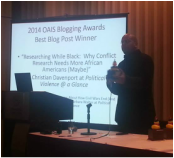
For example, out of the blue on June 2012, I received the following email:
Dear Professor Davenport,
In 2009 you co-authored an article with Professor Allan Stam, published in the Miller-McCune magazine. The article, “What Really Happened in Rwanda,” addressed the controversy that has surrounded your research on Rwanda since you presented your findings at a genocide conference in Kigali in 2003. In the Miller-McCune article you explain that, although your research was well intentioned and you never denied that a genocide took place, you and Mr. Stam have been labelled as genocide deniers.
On your GenoDynamics website, you present some ‘highlights’ of the debate over your research. These include a 2004 press release containing some of your conclusions, as well as a Reuters article that you claim was inaccurate and responsible for the resulting controversy. In addition, you have posted what you say are more careful and accurate media reports on your research. You also offer some ‘reflections of others about the hornet’s nest that [you] stepped into.’
I was, however, quite shocked to find that you present Keith Harmon Snow’s article “Hotel Rwanda: Hollywood and the Holocaust in Central Africa” and Edward Herman’s article “Genocide Inflation is the Real Human Rights Threat” as ‘reflections.’ The work of Keith Harmon Snow and Edward Herman on Rwanda involves a brazen denial of the 1994 genocide against the Tutsi, and the articles that you refer to are emblematic of the denialist discourse these authors have propounded in various publications.
Harmon Snow, for example, has presented his virulent reading of what ‘really happened’ in Rwanda in numerous articles, such as “The US Sponsored ‘Rwandan Genocide’ and its Aftermath,” and “The Rwanda Hitlist: Revisionism, Denial and the Genocide Conspiracy.” According to Harmon Snow, the pre-planned genocide against the Tutsi is a myth; he further argues that “if anyone planned genocide in Rwanda, it was the RPF, and only the RPF.” Edward Herman’s book The Politics of Genocide, which was co-authored with David Peterson, presents a similar account of what happened. It essentially turns the victims of the genocide into perpetrators, making them responsible for their own annihilation. Herman and Peterson openly argue that there was no organized genocide of Tutsi. Instead they state that “the RPF was the only well-organized killing force within Rwanda in 1994.”
These accounts reject the overwhelming weight of scholarship on Rwanda, which concludes that Hutu extremists organized and perpetrated a genocide against the Tutsi population, including Hutu that were opposed to the “Hutu Power” regime. Not surprisingly, Keith Harmon Snow and Edward Herman have denounced such scholarship as mere propaganda that misrepresents what really happened in Rwanda, claiming it is one of the most widely misunderstood events in contemporary history.
In the wake of the genocide against Tutsi in Rwanda, those involved in organizing and implementing the genocide developed a sophisticated ideological discourse aimed at denying their genocidal actions. While not able to deny the occurrence of an episode of mass violence, their discourse aimed at effectively denying the genocide by reinterpreting the event and its essential reality. The narrative account of Keith Harmon Snow and Edward Herman on Rwanda is deeply dangerous, because it recycles much of this denialist discourse.
The fact that you present the accounts of Keith Harmon Snow and Edward Herman as ‘reflections’ raises significant questions about how to interpret your own research and findings. Although you point out that your research does not seek to deny the genocide against the Tutsi, the articles you cite as ‘reflections’ do involve a blatant denial of that genocide.
Given that Harmon Snow and Herman have cited your work in their own publications, I must ask: do you agree with the accounts they present? Or, do you consider that their analyses misrepresents your research and its findings? If so, why do you lend these figures credibility by posting their ‘reflections’, and why do you not decisively distance yourself from their denialist conclusions?
I would be grateful for any comments you could supply to me – on the record, as I am researching these issues for future publications.
Yours sincerely,
Some random law student I never met (not his real name)
Interesting read, huh? Remind you of your recent emails? Well, three things I immediately found interesting.
First, Mr. random law student did not quite catch my use of the word "reflections". On the webpage, we had 7 categories (the 5th is what he is referencing):
1) What we said/what we wrote (“Rwandan Genocide, 10th Anniversary: Correcting
the Record ”)
2) The poorly researched and inaccurate Reuters Article that started all the controversy
(“Rwanda Killings weren’t Genocide”)
3) The more careful efforts that came closer to what we actually said (“Correcting the
Record”)
4) The most careful examination of the topic offered in the print media (Genocide +
Politicide)
5) Reflections of others about the Hornet’s nest that we stepped into:
6) Emails received by GenoDynamics (Samples)
7) A Continuation of the Controversy undertaken by others
By the use of the word "reflection", I was not suggesting anything about the work itself. Indeed, I was simply collecting everything that referenced our research, putting it into categories regarding how the work was used. Some simply quoted what we said, some discussed the controversies raised by our work, some "reflected" on the findings and thought about what they might have meant, none attempted to actually provide any systematic evaluations of their own of the data compiled and offered on our webpage.
Second, this piece was like many others. They acknowledge that we did not deny the genocide, the author nevertheless wishes to push us to distance ourselves from those that do - although of course we never actually support or acknowledge the work. We just reference who mentioned it.
Third, I found the email a bit…. well…. rude. I was kind of used to that after the controversy sparked by disclosures of research at the 10th anniversary as well as growing up in New York city. Nevertheless, I thought that I did not want to respond to the individual for they seemed a lot less interested in discussing facts than attacking. Why try to engage in a civil conversation with such a person?
Nevertheless, I responded on June 11th of that same year:
Mr. Random Student (not my actual greeting),
I am in the process (with Prof. Stam) of clarifying our position relative to the others you have mentioned in your email. In brief, the webpage that you reference (which is currently being revised) listed articles largely in simplistic categories: those that outright attacked us without considering anything that was compiled/analyzed and those that appeared to "reflect" on what we said at least to some extent. As much of this discussion has not been scholarly (i.e., based on the rigorous compilation and evaluation of evidence) we have tended to avoid most of it and proceeded to finish the book which should be done next year. As we complete the manuscript, then we will turn to addressing the issues you raise.
Sincerely
Christian Davenport
To this, Mr. random student responded on June 22nd:
Dear Professor Davenport,
My reply comes somewhat belatedly, but the nature of your response has set me thinking. Although I am grateful for your quick reaction to my letter, I have to admit that I am deeply disappointed by the cursory nature of your reply, which does not in any way answer the questions that I have posed.
In your reaction to my letter, you explain that you are in the process (with Prof. Stam) of writing a book that clarifies your position relative to the others I have mentioned in my letter. You furthermore make clear that you will address my questions sometime next year once the manuscript has been finished. I however cannot understand why you do not directly answer the questions that I have posed. The questions address a serious issue, which is related to your research and therefore call for an immediate answer.
It may well be the case that your website is ‘under revision’, but in one of your ‘simplistic categories’ you do mention the work of Keith Harmon Snow and Edward S. Herman as ‘reflections.’ Their work on Rwanda entails some of the most brazen denial of the genocide against the Tutsi I have ever seen. As a scholar, in what way could you possibly ‘clarify your position’ relative to them other than by denouncing their genocide denial and by distancing yourself from their denialist endeavour?
In your reaction, you state that “as much of this discussion has not been scholarly (i.e., based on the rigorous compilation and evaluation of evidence) we have tended to avoid most of it.” I think that instead of ignoring such ‘discussion’ on what happened in Rwanda, you should have acted, because these authors do draw on your work to present a very questionable alternative version of history. Genocide denial is an intrinsic part of the genocidal process and genocide scholars have the responsibility to critically address such denial, especially if it makes use of one’s scholarly work.
I therefore ask you again: do you agree with the accounts that Keith Harmon Snow and Edward S. Herman present? Or do you consider that their analyses misrepresent your research and its findings? If so, why do you lend them credibility by posting their ‘reflections’, and why do you not decisively distance yourself from their denialist conclusions?
I kindly urge you to answer the abovementioned questions – on the record, as I am researching these issues for future publications. Note that I too have a pressing deadline for publication and I cannot wait another year for an answer to these questions. I do, however, hope that it is not my deadline but the seriousness of the issue at hand which calls for a clear response that motivates you to answer the questions posed.
Yours sincerely,
random law student
As I was traveling at the time and without access to an internet connection, I did not see this original email until some time later. Indeed, I did not see it until returning after the summer (in late August) when I received the following:
Dear Professor Davenport,
A few weeks ago, on the 22nd of June to be precise, I replied to your email (see letter posted below). However, to date, I have not received an answer from you and I therefore want to confirm with you whether you received my email/letter in good order.
Yours sincerely,
random law student
Now, this series of emails raised a few issues for me:
1) I was busily trying to work through a book manuscript, some articles, teaching and advising and did not really have the time to stop, carefully read the email as well as the work that it was referencing and respond.
2) The initial email was sent during the summer (when I was not "working") and thus I was not as diligent as I normally would be going through my email. At that time, I was receiving somewhere between 50-100 emails a day and frankly I was not able to get through them all. This is when I started to include the following under my email signature:
Email Rules of Engagement
- I receive between 75-100 emails per day and thus I might miss an individual email; if you have not heard from me in 3-5 days, resend (no offense taken or intended);
- I prefer direct human engagement and thus my emails are probably shorter than you expect or perhaps desire; and,
- Please use the Subject line to assist me in understanding how I can assist you (recall the 75-100 msgs)
3) I had not read Herman and Peterson or Snow's research and did not want to respond to something I had not read. At that time, I only saw the short references that they made to the work in news articles and on the internet. I still have not finished this book but plan on doing so by the end of March. The idea that I would stop what I was doing and read a non-university press book that I had not previously heard of before I finished my academic case load to help this person emailing me to do their research for them was a bit odd, I thought. In fact, if I were to assist them, I would be doing them a favor and why would I do someone a favor who approached me in this manner? I usually go by my mother's conception of etiquette (discussed another time) and this person was way off the mark. But, what would Budha do? Charles Tilly? KRS-One? You?
4) I found the person emailing me a bit aggressive and reflected (yeah I am using the word again) on how the exchange would have gone if they were in my face. Needless to say, I don't believe that they would be quite as forthright. E-exchanges are very different from real ones. This was also just a bad email. According to the article "Writing Effective Emails", one should use the subject line informatively, ask clearly for one thing and be clear on what response you would like. The subject line was "Questions Concerning Research on Rwanda", which is informative but does not conform to the more reasonable one topic at a time principle as I would have to read material that I had not previously read as well as write something that I had not intended to write. Now, I acknowledge that the authors of the effective email piece also note that one should "go through your inbox regularly and respond as appropriate" but this is just not realistic. We just receive far too much email now and with the constant stream something is always likely to be missed. But I need not go on. I have already addressed my opinions about email elsewhere.
5) I thought about if I had a responsibility to respond and I thought that no, I did not - either to the person emailing me or Herman and Peterson's work for that matter. In the first case, the individual was somewhat rude and I thought that if someone emailing you had violated some general sense of respect and decency, then they were no longer someone that you needed to communicate with. It was like, just because I send you an email, you need to respond to me. And I was like: actually, no I don't. In the second case, I felt that as a researcher, I had a responsibility to produce the best possible scholarship that I could and then release it to the world so that they can check my work, use it or not check it or use it. I put it into the marketplace of ideas and the market decides what to do with it. I am no longer responsible for how it is used any more than the makers of hammers are responsible for what people build with their tools. Indeed, after it is sold in the store, the hammer no longer belongs to the manufacturer. The individual who "owns it" is responsible. Now, I am not punting here. If the hammer is defective, then the manufacturer is responsible. But, if my hammer/dataset is sound, then that is where my role is done.
I may still respond to Herman and Peterson as well as the scholars that have attacked their work referencing mine in passing (e.g., Adam Jones). From what I have read thus far, Herman and Peterson are not empirically-oriented and thus did not complete understand what we did in creating the data that was discussed. In their defense, however, they were not interested in understanding data collection, conflict/casualty estimation, causal inference or social science. They seemed interested in trying to validate particular, politically-charged causal relationships - something that we did not do because the data did not allow it. What we did was use all information available to create a reasonable estimation of casualties as well as battle fronts and draw a reasonable conclusion regarding the relationship between the two: i.e., that increases in the violence corresponded to movements forward of the Rwandan Patriotic Front's troops. We did not speculate on why this correlation existed or the broader point of what it meant. Herman and Peterson did speculate on the meaning - as they are free to do in a democracy and generally free society. Others (like Adam Jones) speculate on the meaning as well - as they are also free to do. Unfortunately, these others are also non-empirically oriented scholars that do not properly understand the intricacies of data collection, conflict/casualty estimation, causal inference or diverse aspects of social science. Again, in their/his defense, they were not interested in doing this.
Accordingly, as neither party seemed to be interested in the business of collecting evidence, rigorously assessing theoretically derived hypotheses in as transparent a fashion as possible and drawing reasonable conclusions, which was my objective, I felt no responsibility to respond to them (until now I suppose). Similar to the random student, I felt no necessity to communicate for we were not engaged in the same enterprise or sometimes on the same planet. Sticks and stones (Jones) should have the same impact as flowers and candy (Herman and Peterson).
Now, this said, I do feel a responsibility to communicate with and have a genuine interest in communicating with those that wish to collect evidence in a rigorous, valid and reliable manner, test this evidence with an appropriate technique, discuss the findings of said evaluations and then think about the implications of these results. Individuals that are interested in these topics, will always find a timely, thorough and civil response when they contact me. EJ: Cue some Sade...
With about a month to go, it will be interesting to see what the future brings in terms of discussion regarding Rwanda, research and responsiveness in communication. But, as I am not actually sending this email myself but through some proxy who is doing this through my account as I attend to some related research matters in preparation for April, I think that I have learned a little something from the past and look forward to what is about to happen as the 20th anniversary of Rwanda 1994 approaches. EJ: Cue up the appropriate Jay-Z…










 RSS Feed
RSS Feed
